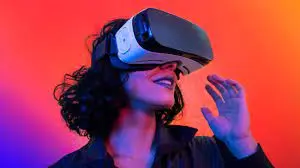Marketers are known for embracing cutting-edge technologies in their quest for innovative marketing strategies. However, recent experiences with NFTs and the meta-verse have left some marketers adopting a more cautious approach. While the upcoming release of Apple’s Vision Pro virtual reality headset has generated excitement, many marketers are wary of investing too early due to past disappointments. This article explores the hesitations expressed by marketers at the Licensing Expo in Las Vegas and sheds light on the reasons behind their cautious stance.
The Allure of Apple’s Vision Pro VR Headset:
Apple’s Vision Pro virtual reality headset has captured the attention of marketers, promising a range of possibilities for immersive marketing experiences. The headset’s official release is expected next year, but marketers are being urged to exercise patience before diving into this latest trend. Representatives from renowned companies such as Tetris, Sprite, and Hasbro voiced their reservations, sharing insights about their approach towards new technologies.
Hesitations Stemming from Previous Disappointments:
The hesitancy displayed by marketers can be attributed to the underwhelming outcomes they experienced with recent ventures into NFTs and the metaverse. While initial enthusiasm surrounded these emerging technologies, their true potential failed to materialize, leaving marketers skeptical about investing resources into Vision Pro-specific virtual reality marketing. The cautious sentiment is further amplified by concerns surrounding the current economic climate and potential repercussions on key client relationships.
Read this also: Big Eyes (BIG) Debuted On The LBank Exchange On June 21
Preserving Brand Reputation:
Hasbro, a prominent player in the licensing industry, serves as an example of a company exercising prudence when it comes to embracing new technologies. Hasbro released NFT-based Power Rangers collections in 2021 and a Monopoly game in 2022. However, the company decided not to further explore the NFT space due to disappointing returns on investment and concerns over potential negative public perception. Casey Collins, president of licensed consumer products at Hasbro, emphasized the importance of preserving the brand’s reputation and avoiding ventures that may evoke negative sentiment.
Evaluating the Vision Pro’s Potential:
This time around, Hasbro intends to adopt a wait-and-see approach before committing to significant investments in Vision Pro virtual reality marketing. By evaluating the initial outcomes of leveraging the headset to enhance brand experiences, Hasbro aims to make informed decisions. The cautious strategy reflects a desire to avoid hasty investments that may yield unfavorable results.
Read this also: How Does an Individual Become a Multi-Millionaire in Real Estate?
Conclusion:
While marketers typically exhibit an eagerness to embrace cutting-edge technologies, recent experiences with NFTs and the metaverse have left them more cautious when it comes to Apple’s Vision Pro VR headset. The potential of the headset is undoubtedly enticing, but marketers are taking a step back, preferring to assess the outcomes before jumping on the bandwagon. Companies like Hasbro prioritize preserving their brand reputation and avoiding ventures that could be perceived negatively by the public. By adopting a more cautious approach, marketers aim to make informed decisions regarding the adoption of Vision Pro-specific virtual reality marketing strategies.
